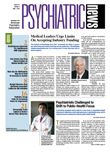In the March 6 issue, Thomas Szasz, M.D., commented on the proposal by Stuart Yudofsky, M.D., to combine psychiatry and neurology into one discipline (Psychiatric News, November 21, 2008). Dr.Szasz addresses issues about psychiatry as a medical specialty and stigma.
I believe that neurology and psychiatry will unite in the future, and this will happen when the reason for their initial split will be resolved.
Theodor Meynert (1833-1892), a neuropsychiatrist from the era before the split, wrote that a “train of thought” is simply the consequence of excitation flowing through a series of cortical cells that have been associated because of previous simultaneous excitations. Every person, of course, has a unique pattern of experience and so develops a unique pattern of cortical associations that represent his memories. These associations are the anatomical substrate of a person's “individuality,” and Meynert referred to them collectively as the ego (German Ich).
We can see that the idea of ego actually refers to connectivity organization of the brain. Freud was a pupil of Meynert and tried to carry on the direction of his teacher, but in the face of the science of his time, he decided to develop his ideas theoretically (unrelated to the brain). He wrote,“ I shall entirely disregard the fact that the mental apparatus with which we are here concerned is also known to us in the form of an anatomical preparation, and I shall carefully avoid the temptation to determine psychical locality in any anatomical fashion. I shall remain on psychological ground....”
Freud mentioned on occasion that in the future we will need to go back and relate these psychological developments to the brain.
Is the time ripe for that? Yes, but only if we introduce a complex-system approach (insights from neural network models) to bridge the remaining gap between psychology, psychiatry, and neuroscience.
“Experience-dependent plasticity” explains how the brain organizes and develops according to experience. Neural network models teach us how internal representations (that is, object relations) of the psychosocial reality are realized by the brain. Imaging findings are beginning to prove Meynert right.
Meynert viewed mental disorders and psychosis as resulting from disturbances to the connectivity organization of the brain. Modern psychiatrist researchers skilled in mathematical modeling of the brain are providing us with initial algorithms that most probably underlie mental disorders—psychiatrists such as Ralph Hoffman (Yale), Giulio Tononi (Wisconsin Madison), Karl Friston (London), Jonathan Cohen (Princeton), and others. They will provide for the science that will reunite neurology and psychiatry into one obvious discipline.
AVI PELED, M.D.
Binyamina, Israel
I am writing to disagree with Drs. Yudofsky and Szasz about the origin of psychiatric stigma. I expect that with some thought and historical review, they will agree that the mentally ill were stigmatized long before the existence of either psychiatry or the medical profession. Psychiatry has inherited that stigma because of its close association with people with mental illness.
As opposed to Dr. Yudofsky, I suggest that the dichotomy that fuels stigmatization is not between body and mind, but between rational and emotional mind. At least back to classical Greece, there has been the split of the rational being strong, masculine, good, and the emotional being weak, feminine, bad. It seems to me that this dichotomy comes down to an issue of control. The experience of being out of control is one of the most noxious in human existence. Rationality allows the illusion of control, while emotions often leave us feeling out of control or controlled by them.
As Dr. Szasz pointed out, psychiatry, in the service of the state, has often tried to enforce external control on the mentally ill vulnerable population. In doing so, psychiatry has served only to worsen the stigma cast upon both patient and physician. However, this stigma will continue until society comes to terms with emotions that are at the core of our behavior, our thought, and our humanity.
MICHAEL V. DELOLLIS, M.D.
Fresno, Calif.
